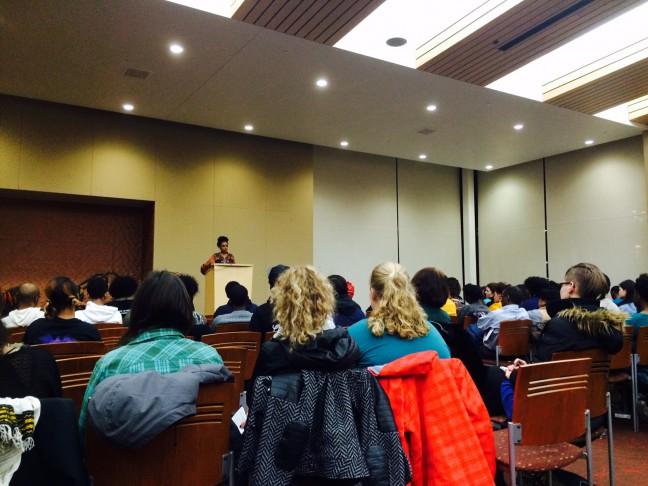Social activist Rahiel Tesfamariam gave an impassioned speech at University of Wisconsin Thursday asking black Christian churches to reimagine the image of God and help black millennials create their own world.
The night opened with everyone standing up and singing the Black American National Anthem, after which Tesfamariam said this is a time black millennials should be proud of because they are living in a moment of the new civil rights movement.
“I used to look at the pictures and look at the imageries, especially the black power movement, and I was mad that I was not born into that era,” he said. “There will be a time when a generation looks back on this moment and will be mad that they’re not living through this.”
Tesfamariam said for many years, people considered the church and social justice inseparable, but currently, more movements are taking place outside of the church because many feel disappointed by the church. She said she wonders if black nationality and black spirituality can still coexist in this era.
Tesfamariam also questioned how black millennials can find empowerment in the church when they cannot see similarities between themselves and God, whom the church has always portrayed as a white man.
Tesfamariam was born in a war-torn country in East Africa, and her siblings were child soldiers and nurses. She came to Washington, D.C. on a six-month visa, during a time of pre-gentrification and high crack cocaine abuse. She lived in a neighborhood where all things black were considered poor, criminal and unholy, while all things good and sacred were white, Tesfamariam said.
“For me, coming to America on a six-month visa, the one thing that separated me from my brothers and sisters was my education,” Tesfamariam said.
With degrees from both Stanford University and Yale University, Tesfamariam said she was accepted into all the schools she applied for and received full financial aid, which made her believe there was something bigger than her that was watching over her, and that she came to the U.S. for a purpose.
She created the Urban Cusp, an online lifestyle magazine featuring “progressive urban culture, faith, social change and global awareness,” according to the Black History Month Keynote brochure. She also worked for The Washington Post as a columnist.
Living in America, Tesfamariam said she began observing racial discrimination around her.
To solve social issues it’s important that church and government be separate and do their own jobs, Tesfamariam said. The church today has been serving as a charity organization, providing food, education, health, basic social needs of community, but those are the responsibilities of the government, she said.
“The church is beginning to do what the government should be doing, and the church is making the allowances for the government to not do its job, by being a one-stop shop,” Tesfamariam said.
The church’s job is to transform human beings and make them into new, better humans, Tesfamariam said. The fundamental way to transform the world, she said, is to transform the humans operating the systems.
Tesfamariam advised young black people to start “creating” instead of “following.” There are always institutions and organizations that young people today are trying to “get in,” but they need to change their mindsets and instead create something of their own, she said.
Using her own experience as an example, Tesfamariam said the reason Washington Post hired her was because she created Urban Cusp.
“My hope is that what we have is a generation that is trained to envision a world as it should be and not just as it is,” Tesfamariam said.


